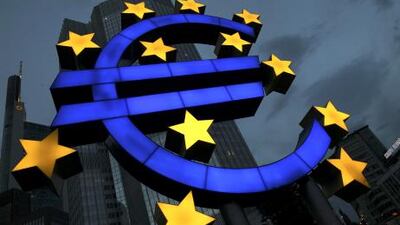Europe is on a nightmare journey from one financial crisis to another. This week, The National is embarking on a journey of its own, charting the crisis on the continent as it unfolds, from Berlin - the continent's economic paymaster - to Athens, the sick man of Europe.
Euro: Talking points
The next talks of European leaders
We will take to the road, the rails and the skies to bring you the drama of the euro zone crisis at this crucial juncture in history.
IMF bigwigs and eurozone experts will convene in Athens this week to assess the country's woes and determine if a default can be avoided. George Papandreou, the Greek prime minister will also visit Berlin for crisis talks with Angela Merkel, German Chancellor, about how to avert a potential waterfall of defaults in Italy and Spain. Then on Thursday, Germany, will vote on whether the European Union's bailout fund should be beefed up to help avoid another economic meltdown.
As these vital meetings unfold, The National will talk to banks, small businesses and the people involved about how the crisis is affecting their pocket and their livelihoods. Over five days, we will travel from Germany to Greece, via Milan and Rome, reporting the picture on the ground.
The contrast in public opinion throughout Europe is likely to be stark.
Further cash for indebted countries is seen as deeply unpopular by the German people and the ruling coalition. But in their third year of recession and living under harsh austerity measures, the Greek people are also vocal on the state of eurozone and have repeatedly taken to the streets in protest. Epitomising the people's plight, a 55-year-old Greek man was hospitalised earlier this month after setting himself alight in protest at his level of debt. Unemployment among the Greek youth is close to 40 per cent, fuelling the political fire. Meanwhile in Italy, a further downgrade in the quality of the Government's debt is expected and measures announced to reign in public debt have drawn wide criticism among workers' unions.
After the Western World became chronically indebted in the years up to 2007, the private sector and banks around the world were bailed out by Governments desperate to avoid a 1920s style depression. The pain of this public excess and burgeoning government deficits are now taking their toll with Europe's leaders now being called to act simultaneously to avoid another economic downturn.
The biggest decisions will be made behind closed doors, but the effects of those decisions are likely to be felt at every level throughout the 17-nation euro zone bloc.
The National will be in Europe to gauge the continent's reaction.

